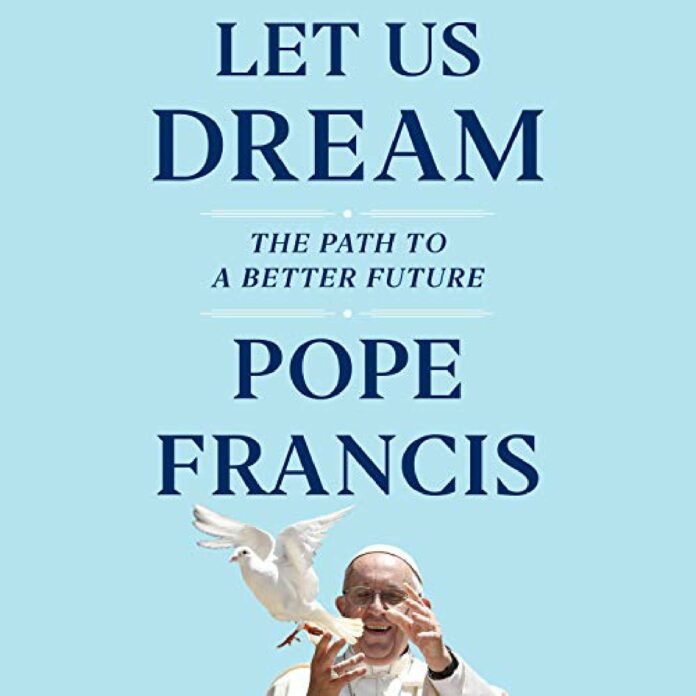Let us Dream – The Path to a Better Future
(Pope Francis’s Vision for a Post-Pandemic World)
Let us Dream is Pope Francis’ latest publication. Written in collaboration with author and journalist, Austin Ivereigh, while the world was caught in the grip of the first wave of the Covid-19 pandemic, it was published towards the end of 2020. It reflects and reprises many of the themes of his encyclical letters, especially Laudato Si and Fratelli Tutti, but with several interesting personal touches. He speaks about his ‘covid moments of rupture and crisis’ in his own life-journey and what he learned from them: his experience of illness as a seminarian; his experience of ‘uprooting’ during his doctorate studies in Germany; and his experience of rejection and exile as a Jesuit leader in Cordoba, Argentina. He mentions the enduring impression made on him by a visit to a refugee camp in Lesbos, Greece, along with his brothers, Bartholomew, Patriarch of Constantinople, and Ieronymos, Archbishop of Athens, and by the films he saw about the treatment of migrants in Lybia (p17). He speaks of how his own ‘ecological awareness’ was awakened during the Aparecida 2007 Meeting of the Latin American bishops, and deepened through his meetings with experts on climate and environmental science, leading him eventually to the writing of his great encyclical letter, Laudato Si’ in 2015 (pp 30-32).
Let us Dream is divided into three parts structured on the See-Judge-Act methodology of Cardinal Joseph Cardijn, made popular by Liberation theologians.
 Pope Francis argues that, if we wish to change the world and ourselves, we must begin by seeing both as they truly are. While keenly aware of the enormous and frightening negative impact of Covid-19 on humanity, Pope Francis prefers to see it as a ‘costly grace’, a challenge and opportunity to re-shape the world differently. This frightening virus, he says, has shaken us up, compelling us to think about our lifestyles and the kind of world we live in. It is, he adds, a visible pandemic which has alerted us to ‘the hidden pandemics of this world, the pandemics of hunger, and violence and climate change’ (p 5). It has opened our eyes to the disastrous consequences of our gross and unconscionable exploitation of planet earth, ‘our common home’. As Francis puts it, we have created a world where ‘nature is suffocated and viruses spread like wildfire and bring down our societies, where heart-breaking poverty co-exists with inconceivable wealth, and where entire peoples like the Rohingya are consigned to the dustheap’ (p 14). The pandemic has shown us that our world is sick, and we cannot be healthy in such a world.
Pope Francis argues that, if we wish to change the world and ourselves, we must begin by seeing both as they truly are. While keenly aware of the enormous and frightening negative impact of Covid-19 on humanity, Pope Francis prefers to see it as a ‘costly grace’, a challenge and opportunity to re-shape the world differently. This frightening virus, he says, has shaken us up, compelling us to think about our lifestyles and the kind of world we live in. It is, he adds, a visible pandemic which has alerted us to ‘the hidden pandemics of this world, the pandemics of hunger, and violence and climate change’ (p 5). It has opened our eyes to the disastrous consequences of our gross and unconscionable exploitation of planet earth, ‘our common home’. As Francis puts it, we have created a world where ‘nature is suffocated and viruses spread like wildfire and bring down our societies, where heart-breaking poverty co-exists with inconceivable wealth, and where entire peoples like the Rohingya are consigned to the dustheap’ (p 14). The pandemic has shown us that our world is sick, and we cannot be healthy in such a world.
 The Covid crisis, Francis states, has brought us to our knees and made us ‘feel a radical powerlessness that we cannot escape on our own’ (p 14). Yet, says Francis, all is not lost. ‘The good news is that an Ark awaits us to carry us to a new tomorrow’, but only if we repent, change our ways, and ‘find our way to the Ark of the ties that unite us: of love, and of a common belonging’ (p 15). In the midst of the doom and gloom created by the pandemic, Francis states that we have witnessed the remarkable self-less dedication and courage of ‘the health workers, the doctors and nurses and other caregivers… men and women who have laid down their lives in service to those most in need’ (p 2). These people witness to what is best in us. Francis also praises the creative ways in which many people are responding to the crisis, reaching out to one another through the wonders of modern technology. These are, he says, signs that we are recovering ‘a little of that fraternity our hearts have missed’, awakening in us ‘an impatient hope that maybe the world could be organised differently’ (p 14).
The Covid crisis, Francis states, has brought us to our knees and made us ‘feel a radical powerlessness that we cannot escape on our own’ (p 14). Yet, says Francis, all is not lost. ‘The good news is that an Ark awaits us to carry us to a new tomorrow’, but only if we repent, change our ways, and ‘find our way to the Ark of the ties that unite us: of love, and of a common belonging’ (p 15). In the midst of the doom and gloom created by the pandemic, Francis states that we have witnessed the remarkable self-less dedication and courage of ‘the health workers, the doctors and nurses and other caregivers… men and women who have laid down their lives in service to those most in need’ (p 2). These people witness to what is best in us. Francis also praises the creative ways in which many people are responding to the crisis, reaching out to one another through the wonders of modern technology. These are, he says, signs that we are recovering ‘a little of that fraternity our hearts have missed’, awakening in us ‘an impatient hope that maybe the world could be organised differently’ (p 14).
The second part of the book focuses on choosing or judging the changes we need to make to bring about a more humane and just world. We need ‘a robust set of criteria to guide us’ and ‘a healthy capacity for silent reflection, places of refuge from the tyranny of the urgent’ (p 51). Above all, we need prayer and a profound listening to the prompting of God’s Spirit. Fortunately, we have all the criteria we require in the beatitudes of Jesus and Catholic Social Teaching [CST] (cf. p 52). Francis spells out four principles that can help us make the right decisions: the principles of the common good, the universal destination of goods, solidarity, and subsidiarity (cf. pp 52-53). However, to apply these principles to our everyday choices, we also need discernment.
‘Discernment’, says Pope Francis, is needed particularly in an era like ours when the categories we relied on to guide us in the past are no longer adequate. However, if we let the Spirit guide us through prayer and reflection, she will enable us to make sense of the changing contours of our world and ‘interpret the signs of the times’, both positive and negative, in the light of the Gospel (p 57). Francis then goes on to draw our attention to some of these signs. On the negative side, we see ‘the exclusion and isolation of the elderly’ (p 58), the growing gap between ‘our need to protect and regenerate Mother Earth and an economic model that regards growth at any cost as its prime objective’ (p 60). On the positive side, we see, for example, ‘the leading role of women’ (p 62) in our world today. He explains how this led him to ‘create spaces where women can lead’ within the Church ‘without clericalizing’ them. He points out that to claim that women ‘aren’t true leaders because they aren’t priests is clericalist and disrespectful’ (p 68).
A second positive ‘sign of the times’, for Francis, is the recovery within the Church ‘of the ancient practice of synodality’ (p 81). He is happy ‘to see how the Church in different countries is embarking on processes that put the synod method into practice’ because, he says, ‘a Church that teaches must be firstly a Church that listens’ (p 84). The synodal method is fruitful because participants listen, and discuss in groups, ‘but above all pay attention to what the Spirit has to say’ to them (p 85) – a perspective often missed in media reports.
In the third part of the book, Francis focuses on the actions required to implement the decisions made and move us towards the desired future – a bit like the ‘Do it’ phase of our 2019 SMA General Assembly. For Francis, there are several steps we must take to exit our current crisis and build a better future.
The first step is ‘to recover the knowledge that as a people we have a shared destination’ and to act with a sense of solidarity, fraternity and communion. If there is one thing we have learned from the pandemic it is ‘that no one is saved alone’ (p 107). What Francis means by solidarity ‘is not the sharing of crumbs from the table, but to make space at the table for everyone’ (p 112).
The second step we need to take is to move away from ‘the neo-liberal economic model which has no real objective other than growth’ (p 110) and create an economic system ‘that puts human dignity, jobs, and ecological regeneration at its core’ and ‘that allows all to access good work, housing, education, and health’ (p 111).
A third step, Pope Francis proposes, is to rehabilitate politics as a noble vocation ‘in the service of the common good’ (p 112). What we need, he says, are politicians who are not content with ‘just managing the apparatus of the state and campaigning for re-election’ but ‘who serve the people rather than who make use of them, who walk with those they represent’ (p 112). Besides committed politicians with sense of vocation and mission, Francis argues that we also need structural reform of our political systems to avoid falling into ‘welfarism’. He states that ‘only a politics rooted in the people’ and ‘open to the people’s own organization, will be able to change our future’ (p 113). This kind of politics respects the culture and dignity of the people it serves. It works with them as much as for them.
For the Pope all genuine reform begins not from the centre but from the peripheries, the margins of our societies. ‘Hidden there’, he says, ‘are ways of looking at the world that can give us all a fresh start’ (p 119). From his personal experience, Francis says that he has come to appreciate ‘the many social movements with roots in parishes or schools that bring people together to make them become protagonists of their own histories’ (p 120). He sees in these movements ‘a source of moral energy, a reserve of civic passion, capable of revitalizing and reorienting the economy’. He mentions his meetings in the Vatican with some of the leaders of these movements, and highlights some of the key changes they advocate: ‘a lifestyle that rejects consumerism and recovers the value of life, solidarity and respect for nature’ (p 126); a move to renewable energy; protecting and implementing biodiversity; ‘allowing the principle of ecological regeneration to shape the decisions we take at every level’ (p 129); ‘ensuring dignified, sustainable, family-friendly housing for all’ (p 130); prioritizing people’s access to meaningful employment while broadening the concept of work, and proposing a ‘universal basic income [UBI]’ (pp 131-132).
Let us Dream ends with an Epilogue in which Pope Francis raises the question: ‘What could be my place in this future, and what can I do to make it possible?’ (p 135). He answers in two words: ‘de-centre and transcend’. By this he means that we have to go out of ourselves towards others. We have to ‘look at the eyes, faces, hands, and needs of those around us; and in this way find, too, our own faces, our own hands full of possibilities’ (p 137). Now is not the time to turn in on ourselves, to retreat; it is rather a time ‘to rethink our priorities – what we value, what we want, what we seek – and to commit to act in our daily life on what we have dreamed of’ (p 6).
I conclude with a few words of evaluation. Let us Dream is a profound and incisive reading of the signs of the times in light of the current pandemic and of the Gospel message. Of all Pope Francis’ writings, this is his most personal and revealing; in it, he speaks with great humility and honesty about his own experiences, negative and positive, what he learned from them, and the impact they have had on his development. Let us dream is a remarkable testimony to the energy, passion, and intellectual acumen of its eighty-four year old author. It contains devastating and incisive critiques of liberal capitalism and the free market economic system which puts profit before people. Above all, Let us Dream is a prophetic and hope-filled call for a more compassionate, caring and fraternal world. The current pandemic has made us see how sick and dangerous our world is and how much it is in need of radical change. The Pope is asking us not to paper over the cracks, but to dream big, rethink our priorities and, guided by the Spirit, create together a new world where all can find a home.
On the negative side, I was not convinced by the reasons he gives for declining the proposals of the Amazonia Synod to admit women to the Diaconate and ordain married men (viri probati) as priests. I also felt that his tendency to put labels on those who disagree with him was not always helpful.
On the whole, though, this is a wonderful little book: inspiring, relevant and courageous. It deserves to be read and pondered by anyone interested in the future of humanity.
Michael McCabe SMA, January 2021

